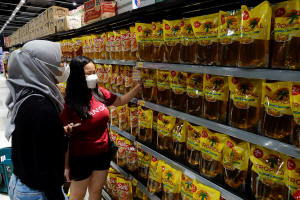|
Sri
Mulyani Indrawati said that with demand exceeding supplies, the
ban announced earlier on Friday is "among the harshest moves"
the government could take after previous measures failed to
stabilize domestic prices.
"We know that this is not going to be the best result," for
global supplies, she said in an interview on the sidelines of
the International Monetary Fund and World Bank spring meetings.
"If we are not going to export, that's definitely going to hit
the other countries."
China and India are among big importers of palm oil from
Indonesia, the world's largest producer accounting for more than
half the world's supply. Palm oil is used in products from
cooking oils to processed foods, cosmetics and biofuels.
Indrawati said previous measures requiring producers to reserve
stocks for domestic use did not result in "the level of prices
that we want. It's still too expensive for the ordinary
household to buy those cooking oils."
At this week's meetings in Washington, policymakers have
expressed concern about growing prospects of food shortages due
to the war in Ukraine, a major producer of wheat, corn and
sunflower oil. World Bank President David Malpass said
repeatedly that countries should avoid hoarding of food stocks,
export controls and other trade barriers to food.
But Indrawati, a former World Bank managing director, said that
as a political leader and policy maker, "you cannot stand in
front of your people when you have the commodity which is needed
by your people and you let (supplies) just go out" of the
country.
(Reporting by David Lawder and Andrea Shalal; Editing by Dan
Burns and Daniel Wallis)
[© 2022 Thomson Reuters. All rights
reserved.]
This material may not be published,
broadcast, rewritten or redistributed.
Thompson Reuters is solely responsible for this content.

|
|





